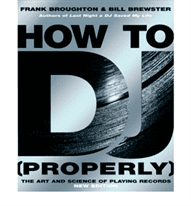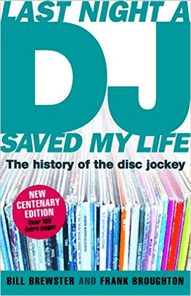Interview with Bill Brewster Part Two
Wednesday, August 10, 2016
by Tat
In this week's Trackhunter blog post, we pick up where we left off with DJ, historian, writer, promoter, and all round good egg Bill Brewster.
Not read the interview with Bill Brewster Part 1?
How did DJ history come about?
Well initially it was just a site that we set up just to publicise "Last Night DJ Saved my Life" when it came out in 1999. We created the website three months later but it was just a very static website for the first three years but in 2003 we added a forum which allowed it to come alive. It became a lively place for DJs around the world to hang out, everyone from David Mancuso to Francois Kevorkian, from Optimo to Prins Thomas were on there. A young Todd Terje was on there when he was about 17-years-old. We are now in the process of winding Djhistory down now. At the moment it is like one of those oil tankers that has sunk off the Scilly Isles, that has ceased to function properly but you can still see it. At the moment I am in the process of building my own website that will be live by about October or November and should be at billbrewster.me. A lot of the content will move over from Djhistory and I will have a little forum on there and revive it from there. I'm going to move the Djhistory forum over to the new site and keep the same URL for it but lock the original posts so no one can add to them but they can get the information still archived on there. If they want to interact they can do this on my forum. It has served its purpose and Frank and I have spent a lot of money on it, all the money we made from the Low Life parties over 20 years, which I tried to work out the other day and we invested all of that into Djhistory. So we have never made a penny from anything we have ever done really, which was pretty idiotic, but it felt like the right thing to do. For me it was about disseminating the culture we really believed in, instead of making a profit. I think it is time to move on as we got a bit bogged down with doing Low Life and doing Djhistory. I would spend a lot of time each week doing things that brought in no income which is a bit insane when you are self-employed. It is very hard to justify that when you are married with a couple of kids, but thankfully I have an amazingly supportive wife who has never said once to me; "For Christ's sake, grow up and get a proper job". She has always been incredibly supportive to all the mad ideas I've had and never thought of intervening and say; "when are you going to do something normal?". Without my wife I wouldn't be able to do any of these things. If I wasn't doing this and had a 9-5 job instead, I would still be doing all this stuff when I got home at night. It is the kind of person I am, I can't stand on the sidelines and be passive, I want to be involved. When I was a teenager I was in The Buzzcocks fanclub and in The Fall fanclub (although they didn't have one) so wrote letters to their manager and pester them. I'm a professional enthusiast more than anything.
The reasons can be quite selfish in one way as I'm doing much of this to find new music for me but the end product is that other people discover that music through me. One of the jobs of a DJ is that they are a music salesperson and you hope to find music that people will hopefully find and love. This is why I do the podcast, I do get a lot of messages and Tweets from people asking me about tracks and I love that as I want them to go and buy the music and support the artists. This is what being involved in the music industry is all about, getting people to hear music and buy it.
You wrote "How to DJ (Properly)" with Frank Broughton in 1999, do you think it is time for a new updated version for the digital age?
No that's it really now, it still sells and I'm really happy with it. When me and Frank (Broughton) started the book we thought if we sell 50,000 copies in our lifetime we will be really happy and we've gone on to sell three times that amount. We are pleased with the impact it has had and the responses we have received, we are really flattered by it all.

Critics of DJs have often said, "you are just someone who plays someone else's music". Yet the DJ is a medium for discovering music and as we discussed earlier that many DJs are now music makers.
People buy into you because of your taste. They like what you do as they have similar tastes to you. What I want to do is introduce people to good music, whether that be my podcast on a Friday or by DJing in a club or posting things on social media. Ultimately it is about supporting this amazing song, go buy it, go support the artist. I try and listen to Gilles Peterson on iPlayer and I listen to Luke Solomon's monthly podcast. Mixes are great but I like listening to people presenting things, I think that's just what I've grown up with. I grew up with Johnnie Walker on Radio 1 and Alexis Korner on Radio 2 and obviously John Peel. I love the human element of radio, although I don't expect to hear a DJ in a club get up on the mic. That said I DJed recently with George from Nightmares on Wax at Electric Elephant and he got on the mic and it was brilliant. It was in the same way Norman Jay does it to hype the crowd up. You would be amazed how many people come up to me in a club and ask for an announcement on the mic. It is usually girls asking for someone's birthday shout out or that their friend has lost their handbag. I had that in Fabric once when a girl came up and asked if we had a mic so they could have a birthday shout out.
You are obviously a scholar of DJ history and black and dance music, how important is it for fellow DJs and music lovers to understand the roots of DJing and our music.
I think it is nice for DJs to know that they do have a culture and their culture is rich. That said it does not mean that someone who has come into the scene playing dubstep should really give a shit about going out collecting disco records. I think it's good that there is enough literature out there that documents the history if they want to explore it. Until we wrote "Last Night a DJ Saved my Life" there really wasn't anything like that. Motivation for doing this came from people talking to us about various things but none of these things being documented before. We thought it was important to do this and try and give DJ culture respectability. There were more books on Bob Dylan than DJ culture. It always felt to me that dance music was always a second class citizen with a lot of that coming from the fact it is body music rather than lyrical music, so lyrically dance music it isn't that interesting. I think all of those English graduates had a lot more to get their teeth into writing about with Bob Dylan or The Beatles rather than they had with Chic. To me that doesn't make that music any less amazing or good. We wanted to fight for the corner of dance music and show people that there have been amazing things and people. What is great with dance music is how forward thinking and futuristic it has been and how it is driven by technology. What attracted me to dance music was that it always sounded like the future and I got bored with rock music as it sounded like the past.
Do we think we've turned that corner with regards to dance music getting more respect compared to traditional guitar music. I make special mention of a mid-nineties gig where someone fed back to us that "anyone can twiddle knobs". My response was that only "knobs twiddle guitars".
I think it has got a little bit more respect, but I do think that those who listen to exclusively non-dance music still think it is inferior. A lot of my favourite rock records were made by shit musicians, you look at a lot of the garage rock records made in the 1960s, they are amazing but made by not very good musicians. Musicianship is often the enemy of creativity, for example if you look at the bloated, blithering shite made by Eric Clapton throughout the 1970s and 1980s then you have to ask yourself, if this is what musicianship has brought us, give me knob twiddlers anyday.

What was the first record you bought?
It was "Ernie the fastest milkman in the west". I used to number the records I bought and I went back to my mum's recently and I found one of the early records I bought "No matter how I try" by Gilbert O'Sullivan and "The show must go on" by Leo Sayer, which were pretty shit, but then again I was only ten. I'm always very suspicious of people who say their first record was The Velvet Underground. The first cool record I bought was probably a Motown re-release, so the Northern Soul sound was the kind of cool things I first came across.
What is more exciting, finding a brand new release that blows you away or something from the 1970s that you missed?
The thrill is exactly the same. Whether it is something that someone gave me that they made in their studio last week and finding some new track I think people don't know about. The excitement for me is translating it to someone else and thinking this is going to sound great on a certain dancefloor. Brand new music is what excites me, it is the thing that gives old music a new concept.
Out of all the genres and scenes you've followed and been a part of which one do you feel has influenced you the most and why?
That is really hard, when I was 17 I discovered punk as it was just starting to take off. The Sex Pistols had just played Cleethorpes Winter Gardens, soon followed by The Stranglers. Shortly after that I moved down to London as I trained to be a chef in 1977, I was moving down more to do with punk than cooking. The thing that affected me most because of the fun involved was acid house. The thing about acid house was that it was like punk in that it shook up the establishment but it was a lot more fun. I'm very fortunate to be the age I am to have lived through punk and then been entranced by house music. When I first heard house music I thought it was terrible but after a friend twisted my arm I went to a couple of house nights. An ex-girlfriend took me to a gay night called Troll and I went and thought "wow this is incredible". So I was about 28 and it took me until about 1989 to really get into it. I was massively into hip hop and rare groove in the late 80s and think that house was so much a change and new beginning after that, that you almost had to abandon everything you knew. It was almost like you had to renounce hip hop and rare groove to be part of this new world.

You have had a long career and close connection with dance and electronic music - how do you maintain that enthusiasm and passion?
It is new music, in all honesty I get a new track sent to me and I'm sixteen again. I'm nearly 57 and I still get excited when someone sends me a new record. New music enthuses me and when I hear a new record I want to share it with someone. I hear something and think "I like this and I can't wait for someone else to like it".
As your music collection grows how do you decide what you are going to play and where, what is your criteria?
These days I play with USB sticks, so I can take 400-500 tracks with me, so it's less of a problem now. Back when I took records out I had to think much harder about the gig and what it requires. I can now put things onto record box and can have something for every eventuality. It was a fact that you would go to some gigs with records and turn up with completely the wrong set and you were going to have two very long hours with people being very angry with you. Now I don't have to worry about that as I have a mixture of a new discoveries and things I've not played for a while. I have clear outs at the start of the year and take things out of my box that I have played a lot.
What record don't you own that you wished you did?
There are a few expensive records I would like to own. There are a couple of albums by Tim Maia who is from Brazil, they're called Racional Volume 1 and 2 and they are very expensive. He was a member of some religious cult who pressed the release and it sold very little at the time. I have them now on CD, so that's fine. There's also a boogie record called "It could happen to you" by Ray Munnings which I almost bought but didn't think it was that rare, but it is now, so wished I'd bought it at the time. I really don't regret not getting these records and I have them all on digital, I've still got a great record collection.
Interview with Bill Brewster Part 1
DJ History Podcast
DJhistory
Bill Brewster on Twitter
DJ with digital music discovered with Trackhunter







